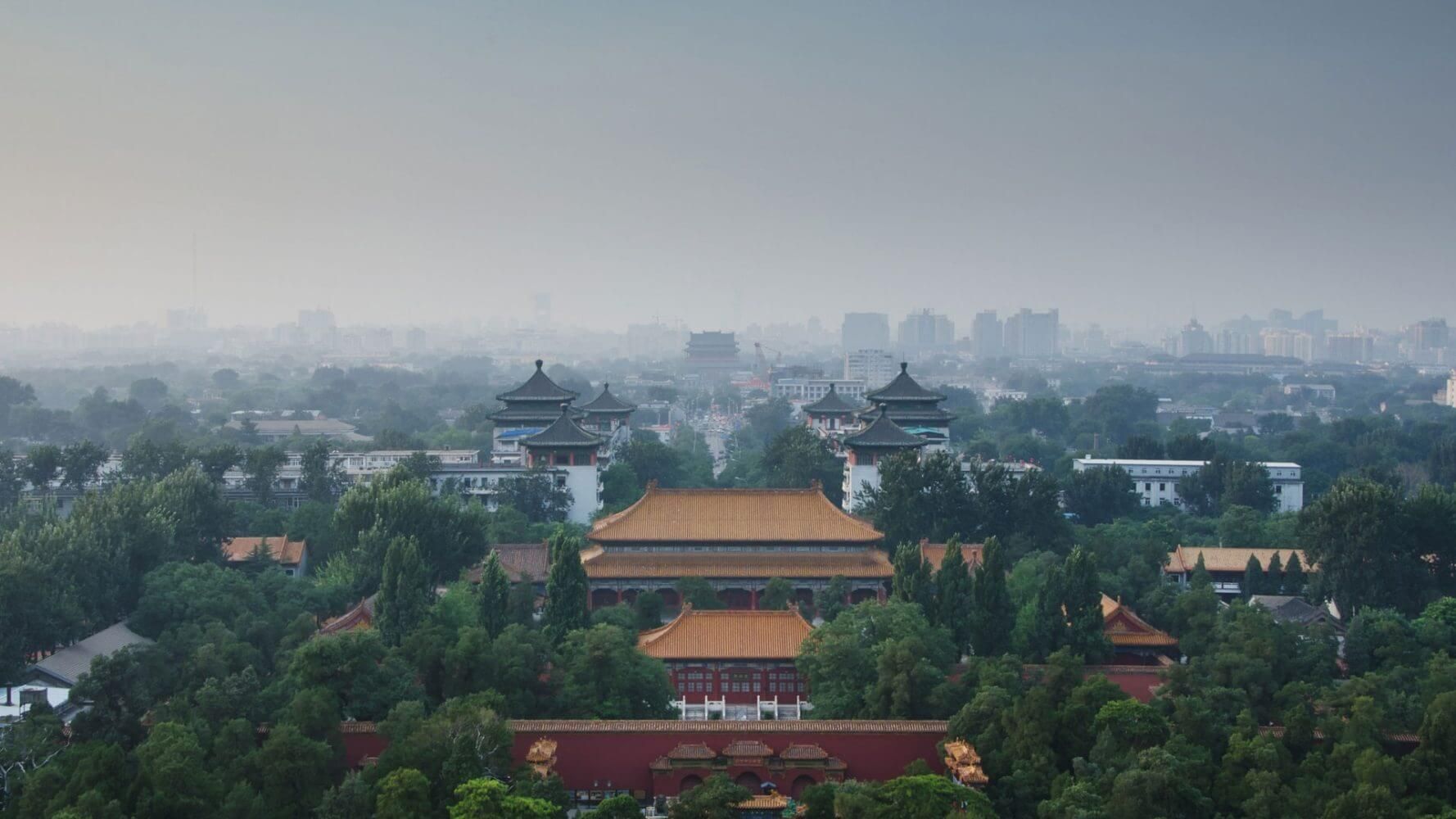
After three months in China, PM Lei Wang discusses his observations on Beijing’s regulatory agenda, ESG progress and the opportunities ahead.
Observations from China
Craig Blessing: Hi, and welcome to another episode of Away From the Noise, Thornburg Investment Management’s podcast on key investment topics, economics and market developments of the day. I’m Craig Blessing, client portfolio manager for international equity at Thornburg, and I’ll be your host. Joining us today is Lei Wang, Rocky, a managing director and portfolio manager for international equity and international equity ESG strategies. In line with the theme of our podcast, Rocky has just returned from 3 months in Shanghai, away from the noise of the US markets but right in the middle of what has been a very eventful year in Chinese markets. In 2020, China was one of only a handful of major countries to register positive growth, and it’s market was one of the best performing in the world, with the MSCI China index returning about 30 percent versus a return of 11 percent for the MSCI All Country World Index ex-US. In 2021, however, Chinese growth slowed and so did its financial markets, with China down about 12 percent versus a gain of 10 percent for the index. One of the drivers of that underperformance has been a number of regulatory measures taken by the government in various sectors of the economy impacting a number of companies which were previously market leaders and leaving many in the west to wonder if the government was attacking the private sector making I s China investible one of the most asked questions in global financial markets. Rocky is very well positioned to help us answer that question and a number of others that investors have been asking. A native of Shanghai, after graduating university, Rocky worked for the People’s Bank of China, China’s central bank, for several years before moving to the US to get his MBA. He joined Thornburg in 2004. Rocky, let’s take a different approach to the is China investible question. Based on your experience and the time you spent in China recently, what do you think the Chinese government is trying to accomplish with their regulatory moves?
Rocky Wang: Thank you, Craig, for the intro. So, you’re right, I spent, 3½ months in Shanghai this time so exactly in the middle of, intensive regulator situation during the period. You know, I think China is not really unique situation because, what Chinese doing is many other country in the west trying to do, as well, but the Chinese just do it their way, being a little more or less undemocratic way. So, what I wanna say here is Chinese government, when they launch this regulatory changes, I do not thinking there is a concerted as attack on the private sector, as media here is trying to picture that way. So actually they just want to target certain behaviors or industrial practices. I think that work against the state goal like achieving sustainable growth. Also sociable responsible growth, which I think many countries in the west also trying to deliver as well. But the difference is the Chinese regulate things in a very intensive, very harsh way, and, particularly lack of transparency without too much explanation, basically asserting overnight. I think that’s lesson Chinese should learn because the impact on the capital market be tremendous, and they pay unnecessary costs by doing that way.
Craig Blessing: Based on what you just said, what do you think China does next, and what’s the regulatory agenda going to be going forward?
Rocky Wang: Craig, it’s like old movie. You know, you and me have been in this industry business long enough. We saw this old movie again, again. So whenever policies shift direction too quick, too extreme, they will swing back with a certain type of moderation. So from here, what I would like to see is two things. No. 1, there will be more clarity of the policy, particularly on execution perspective such as how would you define consumer data privacy, how to consider safe storage of those data, things like that. At a certain point of time, capital markets will realize, things actually were not that bad as we thought. Second, I think the Chinese government likely back peddle on some policies. I think this could trigger unintended consequence, for example, consumption growth slowing down dramatically during the summer or early fall. There was a self-inflicted policy so likely you will see unwinding or back peddling, from here.
Craig Blessing: China’s economy has slowed noticeably this year. What do you think is driving that and how is the government responding?
Rocky Wang: Oh, there are bunch of reasons. I think among them, No. 1, as we said early, harsh regulation are the No. 1 reason, and it’s self-inflicted, so likely we will see some unwinding of those regulations. Second, I think pandemic control is not a significant reason for the slowing economy this year. When I was in China, Shanghai this time, I had to do the vaccine test three, two times every single week, and had to be quarantined for 1 month, despite the fact I already vaccinated. It’s so inconvenient for consumer to move around, so immobility that, definitely hurt consumption this year. Third, price crisis because the politician, as we said, introduce terribly mishandle environmental policies, trigger quite severe power shortage among many manufacturers. I think that’s hurt manufacturing activities during the late summer or early fall. But on this topic, I think the Chinese not alone because we saw the similar thing happen in certain European countries as well. So what response to come? Unwinding some harsh policies with moderation. More realistic policies to smooth out the green energy transition. Uh, consumption, jump start consumption is little bit challenging because you can’t point a gun at people’s head and ask them to consume. You had to waiting for the property market to stabilize. You had to waiting for stock market recover. You had a waiting for the confidence coming back, and then you will see some nice, following of consumption, uh, growth come back again, not necessarily for this year but likely in the first half next year.
Craig Blessing: After notably underperforming other global markets, do you think there’s value in China yet, and if so, where? What do you think the new market leadership is going to be going forward, and will they be the old leaders or new ones?
Rocky Wang: Craig, you know me. I’m always unwilling to make a market call on specific countries, particularly, you know, what could be GDP next year is. You know, that’s not a priority here at Thornburg. Portfolio manager always have pride in terms of buying right stock regardless what is GDP for that country. However, you know what, I do identifying opportunity from here. First, I think it’s coming from internet sector. They are so unloved but, you know, some companies still had very strong fundamental, very solid business model, very high quality fundamental framework, and I think that probably we’ll see some nice re-rating opportunity in that space. Second opportunity I identify related to I would say green energy along the supply chain. For example, the solar panel makers or wind farm operator in that country. I think total address for market or we call TAM, for those, industry is huge and long and there will be multiple years opportunity and here I’m firmly believe China will probably become the leading green energy equipment maker in the world with very competitive pricing and skill.
Craig: Speaking of ESG, the environment has been all over the news lately and ESG has been a very popular investment theme this year as we all know. China isn’t a country that many people thing of when they’re looking for ESG investments. Rocky, how ESG is China?
Rocky: That’s very, very interesting topic. Is quite a fresh learning for me for during this trip, so this time really give me firsthand observation on the ground. The air quality in Shanghai is way better than many years ago. Watching the EV car penetration on the street is way higher than ever. You know, I take taxis, but I would say more than 50 percent taxi I take is all green energy driven either coming from the hybrid or is purely 100 percent electricity. Close to 30 percent new car sales figures already coming from EV cars. That number is around 10 percent for Europe but very low single digits in the US. So China definitely make a lot of progress in terms of EV car penetration. That’s why I identify China has great opportunity from investor perspective in ESG Before the trip, I admit I’m thinking China just was halfhearted on its carbon emission goal, but after trip I definitely change my mind. I think Chinese government, all their politician, are actually very serious and very committed to this. It’s not just they realize air pollution have long term, liability cause to the country or to its citizens’ health, welfare, but actually probably realize actually it’s great business. It’s great, fantastic, huge industry. I think had tremendous opportunity keep their growth sustainable from here and also give them so-called opportunity to claim they are the leader in this next generation industrialization related to energy transition. So I would say day by day what we see in this country is investors are increasingly embracing ESG or environmental awareness
Rocky: At Thornburg recognize a lot of great investment opportunity, not just in Europe but particularly in emerging market, such as China, because the reality is that China’s still largest air polluter in the world but they definitely had a very ambitious goal trying to change that. They going to spend 4 trillion R and B dollars and into anything related to green for next couple of years. That definitely means a lot of investment opportunity for us as well. You know, that’s a really fun part of, being, ESG investors.
Craig Blessing: Many western observers are calling the problems at Evergrande China’s Lehman moment. We know how important the real estate sector is to China’s economy, and we know how big the problems are, but do you think that statement’s entirely accurate?
Rocky: Craig, I disagree. I was in this profession during financial crisis back to oh wow, it’s almost 12, 13 years ago, and so I do have the opportunity to really compare what happened in history versus what happening now in China, whether it’s Lehman equivalent moment in China. My answer is no. Two reasons. Demand size. The demand for property coming from mortgage demand, mortgage application or mortgage qualification is quite harsh for Chinese home buyers. For example, for the first-time buyer in China, you likely you had to put down like 30 or 40 percent at down payment, and for, yeah, you still allowed to buy second piece of property that down payment requirement it could be as high as 60 to 70 percent, so that means there’s not too much leverage from the demand side on this property sectors. The second reason I would say is too big to fail. The Chinese property market so big, it’s, have so much ramification in terms impact on the consumption confidence will hurt the Chinese economy growth. Let’s go back to the base. China GDP growth driven by three things. Exports, fixed asset investment and consumption. Export is fantastic in China because they are so lucky, because all the global supply chain shut down and Chinese manufacturing capacity, facility, pretty much intact because they did pretty damn good job in terms of pandemic control. So they taking market shares from other country, from India and from Vietnam. They increasing market share from 11, 12 percent to 14, 15 percent, but you know what, when things normalize the probably the market share will peak here and even decline little bit. So the driver coming from export-related GDP growth probably will peak or even decline. So it really put the burden on this consumption and fixed asset investment. Consumption is pretty wake into the summer and likely first half next year giving all the reason early we talk about it, so we don’t need to be elaborate again. So really put the burden on the fixed asset investment two-part, property investment and other fixed investment such like industrial investment, cap-ex. You know, you spend tons of money, early you mentioned a figure like 4 trillion R and B spending on the green energy transition project in next couple year, but still not big enough to overset the decline in other segment. So they really need investment property space continue stabilize otherwise this could be called unintended consequence on the GDP growth. One more things is could be tricky year, political tricky year for both country, I mean China and US. In the US, you have this midterm, but in China don’t forget the Communist Party have their annual congress meeting for the 20th session next year, and likely they will reelect a president for next 5 years. Usually, according to historical data, politicians usually like to have GDP print during election year. So from that perspective you will see most stabilize of China GDP growth rather than kind of unthinkable downturn which is kind of unfavorable for any politician to get re-elected. So all things together, I do not think it’s Lehman Brother moment for China related property. I do, actually I had more confidence I think GDP growth or consumption growth will very likely stabilize from early next year, and next year Chinese growth probably is as decent as before.
Craig Blessing: Thanks, Rocky, and thank you for listening. You can find us on Thornburg.com/podcasts as well as on Apple podcasts where you can rate, subscribe and review us. Please join us again soon for the next episode of Away From the Noise and thanks again.
Craig Blessing: Hi, and welcome to another episode of Away From the Noise, Thornburg Investment Management’s podcast on key investment topics, economics and market developments of the day. I’m Craig Blessing, client portfolio manager for international equity at Thornburg, and I’ll be your host. Joining us today is Lei Wang, Rocky, a managing director and portfolio manager for international equity and international equity ESG strategies. In line with the theme of our podcast, Rocky has just returned from 3 months in Shanghai, away from the noise of the US markets but right in the middle of what has been a very eventful year in Chinese markets. In 2020, China was one of only a handful of major countries to register positive growth, and it’s market was one of the best performing in the world, with the MSCI China index returning about 30 percent versus a return of 11 percent for the MSCI All Country World Index ex-US. In 2021, however, Chinese growth slowed and so did its financial markets, with China down about 12 percent versus a gain of 10 percent for the index. One of the drivers of that underperformance has been a number of regulatory measures taken by the government in various sectors of the economy impacting a number of companies which were previously market leaders and leaving many in the west to wonder if the government was attacking the private sector making I s China investible one of the most asked questions in global financial markets. Rocky is very well positioned to help us answer that question and a number of others that investors have been asking. A native of Shanghai, after graduating university, Rocky worked for the People’s Bank of China, China’s central bank, for several years before moving to the US to get his MBA. He joined Thornburg in 2004. Rocky, let’s take a different approach to the is China investible question. Based on your experience and the time you spent in China recently, what do you think the Chinese government is trying to accomplish with their regulatory moves?
Rocky Wang: Thank you, Craig, for the intro. So, you’re right, I spent, 3½ months in Shanghai this time so exactly in the middle of, intensive regulator situation during the period. You know, I think China is not really unique situation because, what Chinese doing is many other country in the west trying to do, as well, but the Chinese just do it their way, being a little more or less undemocratic way. So, what I wanna say here is Chinese government, when they launch this regulatory changes, I do not thinking there is a concerted as attack on the private sector, as media here is trying to picture that way. So actually they just want to target certain behaviors or industrial practices. I think that work against the state goal like achieving sustainable growth. Also sociable responsible growth, which I think many countries in the west also trying to deliver as well. But the difference is the Chinese regulate things in a very intensive, very harsh way, and, particularly lack of transparency without too much explanation, basically asserting overnight. I think that’s lesson Chinese should learn because the impact on the capital market be tremendous, and they pay unnecessary costs by doing that way.
Craig Blessing: Based on what you just said, what do you think China does next, and what’s the regulatory agenda going to be going forward?
Rocky Wang: Craig, it’s like old movie. You know, you and me have been in this industry business long enough. We saw this old movie again, again. So whenever policies shift direction too quick, too extreme, they will swing back with a certain type of moderation. So from here, what I would like to see is two things. No. 1, there will be more clarity of the policy, particularly on execution perspective such as how would you define consumer data privacy, how to consider safe storage of those data, things like that. At a certain point of time, capital markets will realize, things actually were not that bad as we thought. Second, I think the Chinese government likely back peddle on some policies. I think this could trigger unintended consequence, for example, consumption growth slowing down dramatically during the summer or early fall. There was a self-inflicted policy so likely you will see unwinding or back peddling, from here.
Craig Blessing: China’s economy has slowed noticeably this year. What do you think is driving that and how is the government responding?
Rocky Wang: Oh, there are bunch of reasons. I think among them, No. 1, as we said early, harsh regulation are the No. 1 reason, and it’s self-inflicted, so likely we will see some unwinding of those regulations. Second, I think pandemic control is not a significant reason for the slowing economy this year. When I was in China, Shanghai this time, I had to do the vaccine test three, two times every single week, and had to be quarantined for 1 month, despite the fact I already vaccinated. It’s so inconvenient for consumer to move around, so immobility that, definitely hurt consumption this year. Third, price crisis because the politician, as we said, introduce terribly mishandle environmental policies, trigger quite severe power shortage among many manufacturers. I think that’s hurt manufacturing activities during the late summer or early fall. But on this topic, I think the Chinese not alone because we saw the similar thing happen in certain European countries as well. So what response to come? Unwinding some harsh policies with moderation. More realistic policies to smooth out the green energy transition. Uh, consumption, jump start consumption is little bit challenging because you can’t point a gun at people’s head and ask them to consume. You had to waiting for the property market to stabilize. You had to waiting for stock market recover. You had a waiting for the confidence coming back, and then you will see some nice, following of consumption, uh, growth come back again, not necessarily for this year but likely in the first half next year.
Craig Blessing: After notably underperforming other global markets, do you think there’s value in China yet, and if so, where? What do you think the new market leadership is going to be going forward, and will they be the old leaders or new ones?
Rocky Wang: Craig, you know me. I’m always unwilling to make a market call on specific countries, particularly, you know, what could be GDP next year is. You know, that’s not a priority here at Thornburg. Portfolio manager always have pride in terms of buying right stock regardless what is GDP for that country. However, you know what, I do identifying opportunity from here. First, I think it’s coming from internet sector. They are so unloved but, you know, some companies still had very strong fundamental, very solid business model, very high quality fundamental framework, and I think that probably we’ll see some nice re-rating opportunity in that space. Second opportunity I identify related to I would say green energy along the supply chain. For example, the solar panel makers or wind farm operator in that country. I think total address for market or we call TAM, for those, industry is huge and long and there will be multiple years opportunity and here I’m firmly believe China will probably become the leading green energy equipment maker in the world with very competitive pricing and skill.
Craig: Speaking of ESG, the environment has been all over the news lately and ESG has been a very popular investment theme this year as we all know. China isn’t a country that many people thing of when they’re looking for ESG investments. Rocky, how ESG is China?
Rocky: That’s very, very interesting topic. Is quite a fresh learning for me for during this trip, so this time really give me firsthand observation on the ground. The air quality in Shanghai is way better than many years ago. Watching the EV car penetration on the street is way higher than ever. You know, I take taxis, but I would say more than 50 percent taxi I take is all green energy driven either coming from the hybrid or is purely 100 percent electricity. Close to 30 percent new car sales figures already coming from EV cars. That number is around 10 percent for Europe but very low single digits in the US. So China definitely make a lot of progress in terms of EV car penetration. That’s why I identify China has great opportunity from investor perspective in ESG Before the trip, I admit I’m thinking China just was halfhearted on its carbon emission goal, but after trip I definitely change my mind. I think Chinese government, all their politician, are actually very serious and very committed to this. It’s not just they realize air pollution have long term, liability cause to the country or to its citizens’ health, welfare, but actually probably realize actually it’s great business. It’s great, fantastic, huge industry. I think had tremendous opportunity keep their growth sustainable from here and also give them so-called opportunity to claim they are the leader in this next generation industrialization related to energy transition. So I would say day by day what we see in this country is investors are increasingly embracing ESG or environmental awareness
Rocky: At Thornburg recognize a lot of great investment opportunity, not just in Europe but particularly in emerging market, such as China, because the reality is that China’s still largest air polluter in the world but they definitely had a very ambitious goal trying to change that. They going to spend 4 trillion R and B dollars and into anything related to green for next couple of years. That definitely means a lot of investment opportunity for us as well. You know, that’s a really fun part of, being, ESG investors.
Craig Blessing: Many western observers are calling the problems at Evergrande China’s Lehman moment. We know how important the real estate sector is to China’s economy, and we know how big the problems are, but do you think that statement’s entirely accurate?
Rocky: Craig, I disagree. I was in this profession during financial crisis back to oh wow, it’s almost 12, 13 years ago, and so I do have the opportunity to really compare what happened in history versus what happening now in China, whether it’s Lehman equivalent moment in China. My answer is no. Two reasons. Demand size. The demand for property coming from mortgage demand, mortgage application or mortgage qualification is quite harsh for Chinese home buyers. For example, for the first-time buyer in China, you likely you had to put down like 30 or 40 percent at down payment, and for, yeah, you still allowed to buy second piece of property that down payment requirement it could be as high as 60 to 70 percent, so that means there’s not too much leverage from the demand side on this property sectors. The second reason I would say is too big to fail. The Chinese property market so big, it’s, have so much ramification in terms impact on the consumption confidence will hurt the Chinese economy growth. Let’s go back to the base. China GDP growth driven by three things. Exports, fixed asset investment and consumption. Export is fantastic in China because they are so lucky, because all the global supply chain shut down and Chinese manufacturing capacity, facility, pretty much intact because they did pretty damn good job in terms of pandemic control. So they taking market shares from other country, from India and from Vietnam. They increasing market share from 11, 12 percent to 14, 15 percent, but you know what, when things normalize the probably the market share will peak here and even decline little bit. So the driver coming from export-related GDP growth probably will peak or even decline. So it really put the burden on this consumption and fixed asset investment. Consumption is pretty wake into the summer and likely first half next year giving all the reason early we talk about it, so we don’t need to be elaborate again. So really put the burden on the fixed asset investment two-part, property investment and other fixed investment such like industrial investment, cap-ex. You know, you spend tons of money, early you mentioned a figure like 4 trillion R and B spending on the green energy transition project in next couple year, but still not big enough to overset the decline in other segment. So they really need investment property space continue stabilize otherwise this could be called unintended consequence on the GDP growth. One more things is could be tricky year, political tricky year for both country, I mean China and US. In the US, you have this midterm, but in China don’t forget the Communist Party have their annual congress meeting for the 20th session next year, and likely they will reelect a president for next 5 years. Usually, according to historical data, politicians usually like to have GDP print during election year. So from that perspective you will see most stabilize of China GDP growth rather than kind of unthinkable downturn which is kind of unfavorable for any politician to get re-elected. So all things together, I do not think it’s Lehman Brother moment for China related property. I do, actually I had more confidence I think GDP growth or consumption growth will very likely stabilize from early next year, and next year Chinese growth probably is as decent as before.
Craig Blessing: Thanks, Rocky, and thank you for listening. You can find us on Thornburg.com/podcasts as well as on Apple podcasts where you can rate, subscribe and review us. Please join us again soon for the next episode of Away From the Noise and thanks again.
Discover more about:
More Insights

Thornburg Income Builder Opportunities Trust Announces Distribution

A Time for Active Fixed Income

Power of Global Diversification: Incorporating International Equity

The Next Market Shock? Key Risk Factors Investors Must Watch

Thornburg Opens London Office and Expands Team


